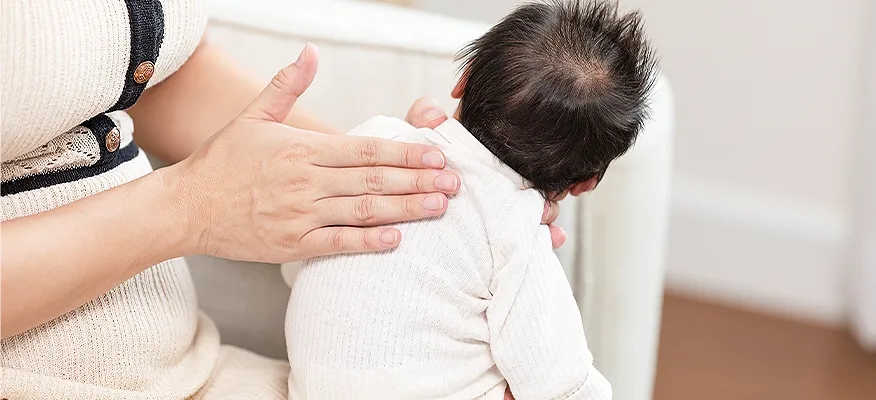How To Stop Newborn Hiccups
- By Reshma Pathare
- 13 Nov 2024

Key takeaways
- Newborn hiccups are often caused by feeding too quickly.
- It also occurs due to overfeeding, swallowing air, sudden temperature changes and reflux.
- To stop hiccups, try pausing and burping your baby and changing their feeding position.
- Offering a pacifier, giving gripe water, and using a warm bath are also effective.
- Prevent hiccups by ensuring proper feeding techniques and burping your baby regularly.
- Hiccups are generally harmless and tend to decrease as your baby's digestive system matures.
Rate our article
We'd love to know!
- 1
- 0
- 1
- 2
Related articles
See AllFrequently asked questions
Get the information you need.
Newborns often hiccup due to their immature diaphragm and nervous system, which are still developing. Additionally, feeding habits, such as swallowing air or overeating, can trigger hiccups.
No, newborns should not be given water to stop hiccups. Infants under six months should only consume breast milk or formula as water can interfere with their electrolyte balance.
Yes, you can feed your newborn while they have hiccups. Sometimes continuing to feed can help stop the hiccups, though it’s also fine to pause and burp them first.
Hiccups are usually not dangerous for newborns. They are a common occurrence and generally harmless. If hiccups seem persistent or cause distress, consult a pediatrician.
Baby hiccups in the womb are a normal part of fetal development and usually don't require intervention. If concerned, consult your healthcare provider for reassurance.
To soothe baby hiccups, try burping them, holding them upright during and after feedings, offering a pacifier, or gently patting their back.
Prevent hiccups by feeding your baby in an upright position, burping them regularly, feeding smaller amounts more frequently, and ensuring a calm feeding environment.
Baby's hiccups feel like small, rhythmic jerks or spasms. If your baby is in the womb, you may feel these as tiny, regular movements.
When newborns have hiccups, you can pause feeding to burp them, offer a pacifier, or hold them upright. Most hiccups resolve on their own.
Your infant may get hiccups frequently due to feeding too quickly, swallowing air, or having an immature diaphragm. These triggers are common in newborns.
Newborn hiccups typically last a few minutes but can sometimes go on for up to an hour. They usually resolve on their own without intervention.
Yes, it is normal for a newborn to have hiccups. They are a common and generally harmless occurrence during infancy.
Hiccups after eating can occur if your newborn swallows air, eats too quickly, or is overfed. These actions can cause the diaphragm to contract and result in hiccups.
The frequency of hiccups can vary, but it's common for newborns to experience hiccups multiple times a day, especially in the first few months of life.
Yes, you can breastfeed while your baby has hiccups. In some cases, the sucking action may help relieve the hiccups. However, if they cough or express irritation, stop breastfeeding them.
How was the experience with article?
We'd love to know!